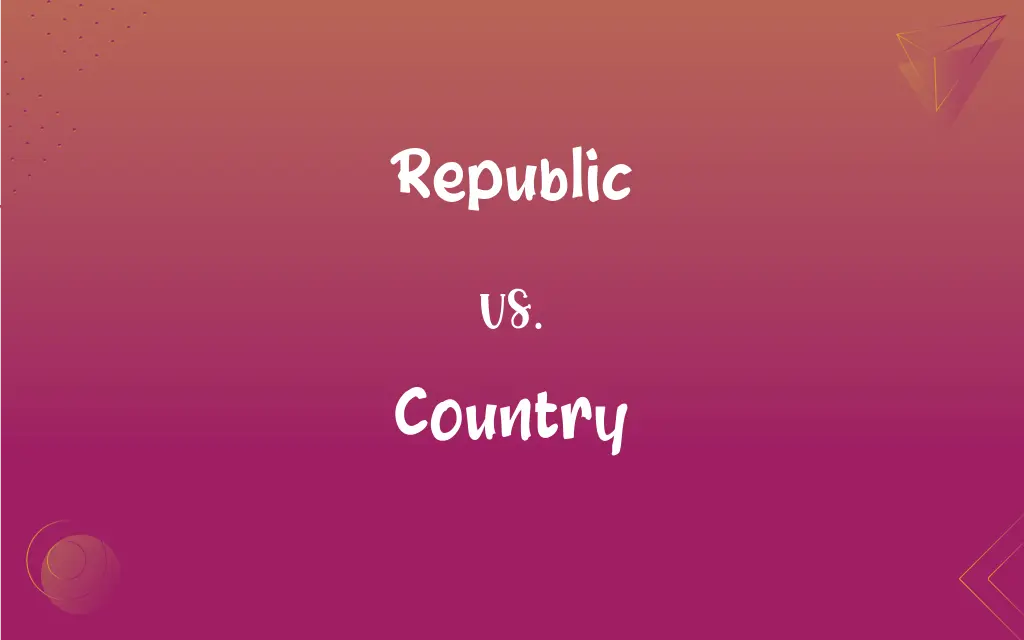Republic vs. Country: What's the Difference?
Edited by Aimie Carlson || By Harlon Moss || Published on December 15, 2023
A republic is a form of government where the head of state is elected, whereas a country is a defined territory with its own government and borders.

Key Differences
A republic is defined by its form of government, where representatives and leaders are elected by the citizens. A country, however, refers to a distinct geographical area with its own borders, government, and sovereignty.
In a republic, the head of state is usually a president, elected by the people or representatives, emphasizing a democratic process. A country can have any form of government, including a monarchy, dictatorship, or a democratic system.
Citizens of a republic typically participate in the electoral process, influencing their government's policies and leadership. In contrast, a country's identity is broader, encompassing its people, culture, history, and political structures regardless of the form of government.
The concept of a republic has its roots in ancient Rome, symbolizing a system opposed to hereditary monarchy. The concept of a country is more general and historically refers to any distinct territorial entity recognized as an independent nation.
A republic is recognized based on its government's structure within the international community. A country's recognition, however, depends on its sovereignty and the acknowledgment of its borders and government by other nations.
ADVERTISEMENT
Comparison Chart
Definition
A form of government with elected leaders
A territory with its own government and borders
Head of State
Typically a president or elected official
Can vary: president, monarch, dictator, etc.
Governance
Based on election and representation
Can have any form of governance
Basis of Identity
Political structure and governance
Geographical, cultural, and political identity
International Aspect
Recognized for its government form
Recognized based on sovereignty and territory
ADVERTISEMENT
Republic and Country Definitions
Republic
In a republic, public offices are appointed or elected rather than inherited.
In the Italian republic, leaders are elected through democratic elections.
Country
A country is a nation with its own government, occupying a particular territory.
Japan is a country known for its unique culture and technology.
Republic
A republic is a state where the supreme power rests in the body of citizens entitled to vote.
France is a republic, with a president as its head of state.
Country
The term 'country' refers to both the physical territory and its population.
Australia is a country famous for its diverse landscapes and wildlife.
Republic
A republic operates under a constitution or set of laws.
The United States is a republic governed by the Constitution.
Country
A country is defined by its geographical boundaries.
Canada is the second-largest country in the world by total area.
Republic
A republic emphasizes the well-being of the public and common good.
The German republic focuses on social welfare policies for its citizens.
Country
A country has sovereignty and the power to govern itself.
Sweden is a country with a long history of neutrality and independent governance.
Republic
A republic often has a system of checks and balances in governance.
The Indian republic has a judiciary independent of its executive and legislative branches.
Country
Countries are recognized internationally by their borders and government.
Brazil is a country recognized for its large size and influence in South America.
Republic
A political order whose head of state is not a monarch and in modern times is usually a president.
Country
A nation or state.
Republic
A nation that has such a political order.
Country
The territory of a nation or state; land.
FAQs
What is a republic?
A republic is a form of government where the head of state and other officials are elected by citizens.
What defines a country?
A country is a distinct geographical territory with its own government and sovereignty.
Can a republic be a form of a country?
Yes, a republic is a form of government that a country can have.
Are all countries republics?
No, not all countries are republics; some are monarchies or other forms of governance.
How is a country recognized internationally?
A country is recognized internationally by its defined borders, government, and sovereignty.
Do republics have a constitution?
Most republics operate under a constitution or a set of laws.
Can a country change its form of government?
Yes, a country can change its form of government, for example, from a monarchy to a republic.
What's a key feature of a republic?
A key feature of a republic is its elected leadership and representation of citizens.
What is the role of citizens in a republic?
Citizens in a republic typically have the right to vote and influence government decisions.
Do all republics have presidents?
Most republics have presidents, but some may have different titles for their heads of state.
What are the responsibilities of a country's government?
A country's government is responsible for maintaining sovereignty, law and order, and providing services to its citizens.
Is a republic always democratic?
A republic is generally democratic, but the level of democracy can vary.
What determines a country's borders?
A country's borders are determined by geographical features, historical events, and political agreements.
How is a republic governed?
A republic is governed through elected representatives and adherence to constitutional laws.
Can a republic have a monarch?
Typically, a republic does not have a monarch, as leadership is elected rather than inherited.
Can a country exist without being recognized by others?
A country can exist de facto, but international recognition is important for full sovereignty.
How do countries interact with each other?
Countries interact through diplomacy, trade, treaties, and international organizations.
What is the difference between a republic and a democracy?
A republic is a form of government with elected officials, whereas democracy is a broader principle emphasizing equal participation of citizens in decision-making.
What is the role of international law in defining a country?
International law plays a crucial role in defining a country's sovereignty, borders, and recognition by other states.
What gives a country its identity?
A country's identity is shaped by its culture, history, population, and form of government.
About Author
Written by
Harlon MossHarlon is a seasoned quality moderator and accomplished content writer for Difference Wiki. An alumnus of the prestigious University of California, he earned his degree in Computer Science. Leveraging his academic background, Harlon brings a meticulous and informed perspective to his work, ensuring content accuracy and excellence.
Edited by
Aimie CarlsonAimie Carlson, holding a master's degree in English literature, is a fervent English language enthusiast. She lends her writing talents to Difference Wiki, a prominent website that specializes in comparisons, offering readers insightful analyses that both captivate and inform.






































































